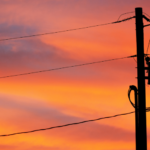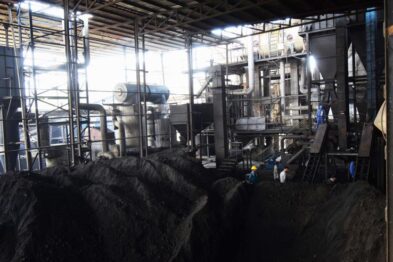All 2025 Charts 2025 Fact Sheets Full 2025 Poll Results
Seventy-two percent of Americans express concern about the environmental impacts of AI, including 41% who say they are very or extremely concerned and another 30% who are somewhat concerned, according to a new survey from the Energy Policy Institute at the University of Chicago (EPIC) and The Associated Press-NORC Center for Public Affairs Research. Concern about AI’s environmental impact (41% very or extremely concerned) exceeds other industries like cryptocurrency (29%), meat production (29%), and air travel (23%).
Looking ahead, Americans are more likely to believe AI will be harmful rather than helpful to society, the economy, and the environment in the next 10 years, but they are divided on its impact on them personally.
In addition to AI, the survey explored attitudes towards climate change, energy policy, and electric vehicles (EVs). Thirty-seven percent of Americans say they would be at least somewhat likely to purchase an EV the next time they are in the market for a new car. However, the high upfront cost remains a significant barrier for many. About 8 in 10 Americans across income levels cite the purchase price as an obstacle to buying an EV. Financial considerations like saving money on gas (68%) and maintenance savings (59%), along with reducing personal impact on climate change (60%), are cited by a majority as reasons to consider buying an EV. Just over half (54%) list tax breaks, which were recently ended as part of the One Big Beautiful Bill Act, as a reason to consider purchasing an EV.
Financial concerns are also impacting Americans’ willingness to pay a premium for an American-made EV over one made in China. When presented with a choice between purchasing a more expensive EV made in the United States and a less expensive vehicle made in China, the majority of Americans prefer the domestic option if the price difference is $2,000 or less. As the price gap widens, that preference declines, with more consumers opting for the less expensive Chinese vehicle. Compared to 2024, Americans are now more likely to prefer the cheaper Chinese-made vehicle.
EPIC and AP-NORC have been tracking Americans’ willingness to pay a fee to combat climate change since 2016. Today, just 38% of Americans say they would be willing to pay a $1 monthly carbon fee, down from 52% in 2021. Their support for the fee drops as the fee gets higher: about 3 in 10 are willing to pay $10 or $20, and about 2 in 10 would pay $75 or $100.
“Despite the federal government’s retreat from climate policy, this poll demonstrates that support for climate action remains meaningful and largely unchanged,” says Michael Greenstone, the Milton Friedman Distinguished Service Professor in Economics and director of the Energy Policy Institute at the University of Chicago (EPIC). “We find that Americans are, on average, willing to pay about $30 a month on their energy bills to combat climate change, similar to 2023 but down slightly from 2024. Additionally, most still want regulations to limit emissions from power plants and vehicles. They want funding for states to help cope with the impacts of extreme weather. And they want to expand clean energy, not fossil fuel production. So, it seems that policy is moving away from people’s preferences.”
While less than half of Americans support paying a monthly carbon fee on their energy use, 56% support taxing companies for the carbon they emit. This reflects broader public sentiment about who should shoulder the most responsibility for addressing climate change. About six in 10 Americans say oil and gas companies (62%), the federal government (60%), and large businesses and corporations (58%) bear a great deal or a lot of responsibility. By contrast, 31% say the same about individuals, a drop of 19 percentage points from 50% in 2019.
Most Americans (60%) believe that the U.S. should play a more active role in global efforts to fight climate change, while 15% think the U.S. should be less involved.
“Many Americans see climate and the environment as significant issues that need a more systemic response,” said Jennifer Benz, deputy director of the AP-NORC Center. “This poll suggests that Americans agree the federal government and private sector businesses have a role to play, and many are open to a range of policies that can help address some of its impacts.”
About half of Americans say energy policy (50%) and climate change policy (47%) are extremely or very important to them personally, while 52% say the same about immigration. When it comes to specific policies, 70% support protecting conservation lands and wildlife, including majorities of both Republicans and Democrats. A majority also support enforcing clean air and water regulations (61%), about half support reducing U.S. greenhouse gas emissions (51%), and about half say funding states to help communities adapt to climate change (51%) is important.
Similarly, 55% say expanding the U.S. clean energy industry is important, while only a quarter say the same about expanding the U.S. fossil fuel industry. Nearly half of Americans (48%) oppose auctioning off public land for drilling.
Among Republicans, attitudes vary significantly by age. Younger Republicans are more likely than their older counterparts to view expanding the U.S. clean energy industry as important and are more supportive of tax incentives for EVs. In contrast, older Republicans are much more likely to support expanding U.S. oil and gas production. Among Republicans who believe climate change is happening, a growing share of younger adults now say it is at least mostly human-driven (42% vs 29% of Republicans age 45 and older), up from 26% across both age groups in 2017.
Ninety-one percent of Americans have experienced an extreme weather event such as a hurricane, drought, flood, unusual temperatures, or wildfire in the past year. Those who have firsthand experience are more likely to believe climate change is happening and attribute it to human activity, compared to those who have not. Among those who have experienced extreme weather, about 9 in 10 believe climate change was a contributing factor. They are also more likely to support federal action to regulate emissions from power plants and vehicles, and to fund efforts that help communities adapt.
While three-quarters of Americans believe the federal government should play a major role in providing aid and helping communities rebuild after a natural disaster, only about a quarter have confidence that the Federal Emergency Management Agency (FEMA) is prepared to respond to one in their neighborhood. Confidence in FEMA is low among both Democrats and Republicans. It is also low among those who have experienced extreme weather events in the past year, as well as those who have not. More Americans express confidence in the national weather service (39%), local weather forecasters (39%), and local first responders (56%).
About the Survey
This survey was conducted by The Associated Press-NORC Center for Public Affairs Research, with funding from the Energy Policy Institute at the University of Chicago (EPIC). Staff from NORC at the University of Chicago, The Associated Press, and EPIC collaborated on all aspects of the study.
Data were collected using both probability and non-probability sample sources. Interviews for this survey were conducted from September 2 – 18, 2025 with 3,154 adults age 18 and older representing the 50 states and the District of Columbia.
The probability sample source is the AmeriSpeak® Panel, NORC’s probability-based panel designed to be representative of the U.S. household population. The non-probability sample was provided by Dynata based on quotas related to age, race and ethnicity, gender, and education.
The overall margin of sampling error for the combined sample is +/- 2.4 percentage points at the 95 percent confidence level, including the design effect. The margin of sampling error may be higher for subgroups. Sampling error is only one of many potential sources of error and there may be other unmeasured errors in this or any other survey.
About the Energy Policy Institute at the University of Chicago
The Energy Policy Institute at the University of Chicago (EPIC) is confronting the global energy challenge by working to ensure that energy markets provide access to reliable, affordable energy, while limiting environmental and social damages. We do this using a unique interdisciplinary approach that translates robust, data-driven research into real-world impacts through strategic outreach and training for the next generation of global energy leaders. epic.uchicago.edu @UChiEnergy
About The Associated Press-NORC Center for Public Affairs Research
The AP-NORC Center for Public Affairs Research taps into the power of social science research and the highest-quality journalism to bring key information to people across the nation and throughout the world.
- The Associated Press (AP) is an independent global news organization dedicated to factual reporting. Founded in 1846, AP today remains the most trusted source of fast, accurate, unbiased news in all formats and the essential provider of the technology and services vital to the news business. More than half the world’s population sees AP journalism every day. ap.org
- NORC at the University of Chicago is one of the oldest objective and nonpartisan research institutions in the world. norc.org
The two organizations have established The AP-NORC Center for Public Affairs Research to conduct, analyze, and distribute social science research in the public interest on newsworthy topics, and to use the power of journalism to tell the stories that research reveals. Learn more at www.apnorc.org.














